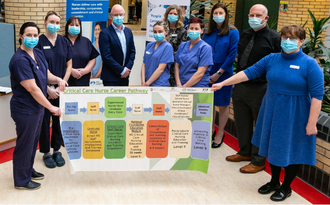Critical Care
Critical Care Nursing
Considering a career in critical care nursing?
The National Clinical Programme for Critical Care have developed a structured clinical, academic and professionally supported career pathway.
In Sept 2017 Mr Simon Harris TD, Minister for Health launched the Critical Care Nurse Career Pathway. This is a nationally standardised Critical Care Nursing postgraduate specialist education and training pathway. Through Career Pathway, any nurse, including new graduate nurses, commencing a career in critical care can now gain immediate access to postgraduate critical care nursing education, training and certification. The National Foundation Education Module is now available in University College Cork and University College Dublin.

Critical Care Nursing career pathway
Further details available at:
UCC: National Foundation Module in Critical Care Nursing
UCD: Certificate of CPD National Foundation Education Module in Critical Care Nursing
The Future of Critical Care in Ireland
The National Clinical Programme for Critical Care hosted its second National Critical Care Conference ‘The Future of Critical Care in Ireland’ on Friday 21st January 2022 livestreamed from the Printworks in Dublin Castle.
Minister for Health, Mr. Stephen Donnelly gave the Keynote Address and discussed the Government’s strategic plan to increase Critical Care capacity in Ireland. HSE CEO, Mr. Paul Reid, also addressed the conference. The Conference heard from Senior Intensive Care Medicine Doctors, Senior Critical Care Nurses and Health & Social Care Professionals who outlined a broad view of the Multi Disciplinary delivery of Critical Care to Patients in Ireland into the future, through data analysis, workforce planning all based on experiences particularly in COVID over the past 2 years. Dr. Colm Henry, HSE CCO gave the closing address to what was a hugely successful day.
- National Critical Care Programme Conference
- Critical Care Conference 2022 Programme (PDF, size 595 KB, 2 pages)

Tallaght University Hospital: Navigating the Critical Care Nurse Career Pathway; From New Graduate to Advanced Practice
Minister for Health Stephen Donnelly TD visited Tallaght University Hospital to learn first-hand about the innovative recruitment strategy being embraced by the Nursing staff in Critical Care to enable them to safely open a new 12 bedded Critical Care Unit.
Minister Donnelly welcomes this innovative approach clearly demonstrating how creativity and a shared vision can provide solutions to the challenges our health service is facing in ensuring there is adequate expertise developed for the increasing demands in our health service, in this case for critical care nursing.
L to R are Sinead Doyle, Clinical Nurse Educator, Shauna Delaney, Clinical Nurse Educator, Lisa Dunne, CNM 3 Critical Care, Minister for Health, Stephen Donnelly, Fiona Whelan, New Graduate Nurse Critical Care, Aine Lynch, Director of Nursing, Tallaght University Hospital, Eileen Whelan, Chief Director Of Nursing & Midwifery, Dublin Midlands Hospital Group, Derek Cribbin, Nurse Lead, National Clinical Programme for Critical Care, Patricia Morrison, Assistant Director of Nursing, Tallaght University Hospital
Census 2021
National Clinical Programme for Critical Care has completed the 2021 adult critical care bed capacity Census Report.
The report includes:
- summary
- risk stratification
- census tables
- critical care nursing workforce requirements
- ICU isolation room 2018 survey on air ventilation, air filtration equipment and plant.
Read the National Adult Critical Capacity Census Report 2021
The Critical Care Programme (CCP) is a collaborative multi-professional patient-centred initiative administered by the National Clinical Programmes, Clinical Strategy and Programmes Directorate, HSE, in liaison with the Joint Faculty of Intensive Care Medicine of Ireland (JFICMI) and Intensive Care Society of Ireland (ICSI).
The aim of the Critical Care Programme is to improve the survival of critically ill patients.
To achieve this, the objective of the Critical Care Programme is critical care performance improvement by strengthening critical care capability. Capability domains include- information, process mapping, capacity planning, communication and engagement, and governance and leadership.
The principal priority of the Critical Care Programme is capacity maintenance and expansion in line with its Critical Care Model.
COVID-19 Critical Care Nursing
- Critical Care Escalation Plan Nursing
A guide supporting the role of critical care nurses in response to an immediate surge in critical care capacity and increased requirements of critically ill patients during the COVID-19 pandemic. - Access to an online educational resource for nurses redeployed to critical care.
Please share widely. This resource is intended as a guide for Practical Critical Care Nurse training relating to the CoVid-19 pandemic and can be used as required locally. It should be accessed by nurses both providing education and those undertaking education. Each section can be accessed when required. - CoVid Prep Intensive Care Orientation Manual for Nurses redeployed to Critical Care
This document has been developed collaboratively by critical care clinical facilitators nationally. For use as deemed appropriate across your units. - Tips and learning from the Marathon ESICM Sessions
- Organisational Tips and Learning from the Marathon ESICM Sessions
- National Critical Care Workforce Report 2018
COVID-19 Intensive Care Medicine
- CD19-003 Guidance document for the Intensive Care Management of the adult patient with confirmed or suspected COVID-19 (PDF, size 395.1 KB, 6 pages)
- Joint Faculty of Intensive Care Medicine Ireland PPT on the care of a critically ill patient with COVID-19
- Specific Antiviral Therapy in the Clinical Management of Acute Respiratory Infection with SARS-CoV-2 (COVID-19)
- COVID-19 Intensive Care Unit (ICU) Critical Care Protocols Beaumont Hospital
Please follow this link for the most up to date guidelines on coronavirus guidelines.
Some of the Critical Care Programme deliverables for 2019 are:
- National Adult Critical Care Capacity Planning
- Support the Implementation of the Model of Care for Adult Critical Care
- Critical Care Nursing Integrated Career Pathway, Workforce Planning, Education and Training Framework
- Intensive Care Medicine Workforce Planning
The Programme team is led by Dr Michael Power, Clinical Lead, Ms Una Quill, Programme Manager, Mr Derek Cribbin, Nurse Lead and includes representatives from multiple professions and specialities, such as critical care medicine, CSPD administration, surgery, emergency medicine and allied health professions.
A priority for the CCP is the implementation of a Model of Care for Adult Critical Care that will ensure that critical care services are available to all critically ill patients in a timely fashion regardless of the type of illness or geography. In other words, the right treatment at the right time in the right place. CCP has adopted the Recommendations in the Prospectus Report and has facilitated the implementation of an Adult Critical Care Model of Care for the delivery of critical care services throughout the country. The Critical Care Programme Model of Care requires a dedicated Transport and Retrieval network. To this end, CCP is working closely with other Programmes including Transport Medicine, Anaesthesia and Emergency Medicine to implement this.
CCP has adopted the JFICMI National Standards for Adult Critical Care Services 2019. In fulfilment of key objectives of the Critical Care Programme and the Joint Faculty of Intensive Care Medicine of Ireland (JFICMI), the National Office of Clinical Audit (NOCA) has established an Irish National Intensive Care Audit (ICU Audit).
The Irish National ICU Audit (INICUA) was established by NOCA in 2013 and focuses on the care of patients in adult and Paediatric Intensive Care Units, the very sickest patients in the hospital.
Read more about the National ICU Audit.
Objectives of the Irish National ICU Audit
1. Measure the quality of care in ICU by benchmarking outcomes.
2. Use the Audit to drive improvements in the quality of care.
3. Measure activity to inform the configuration of critical care.
4. Provide data to support the Hospital In-Patient Enquiry system and activity-based funding
5. Audit healthcare-associated infection.
6. Audit potential organ donors and organ donation.
7. National Bed Bureau for Critical Care.
8. National Data Base for ICU Audit
9. National Coverage for ICU Audit.
The Irish National ICU Audit is currently live in:
- 22 adult hospitals encompassing 26 Critical Care units including 3 specialist units
- 2 Paediatric hospitals
- Audit implementation is scheduled in a further 4 adult hospitals during 2021.
Due to the immediate requirement for ICU Audit data to support and inform reconfiguration of critical care services currently, a short INICUA report on 2019 data is available here on the NOCA website.
The ICU-BIS was fast-tracked by NOCA and is up and running since March 2020. This is informing front line services, HSE and DOH, daily on the national Unit bed capacity and monitoring COVID ICU admissions.
Intensive care medicine interfaces with a wide variety of other medical specialities and these are reflected in the range of workstreams to which CCP contributes such as Critical Care Pathways for Obstetric Patients, Sepsis, and Workforce Planning.
